The Use of Smartphones in Geography Learning: A 21st Century Learning Innovation in Identifying Nature Appearances Based on Fieldwork
DOI:
https://doi.org/10.3991/ijim.v16i22.36151Keywords:
geography, smartphone, fieldwork, nature laboratoryAbstract
Geography learning process can be done both indoor and outdoor. Geography learning can provide new findings/ concepts from a natural phenomenon which exists in the field. In order to build an understanding, concept, and even findings; geographer can utilize fieldwork-based geography learning. It is necessary to have a framework that explains the existence of the study location. The purpose of this study is to give space or scope for geography learning which emphasizes fieldwork-based learning in natural laboratories using a smartphone in data collection. The method used is a field survey conducted by determining the location points that will be used as access in field-based geography learning, with a landscape and social approach. After that, it is processed to get routes and learning areas that are ready with smartphones. Furthermore, it is applied to students to carry out field-based learning using smartphones. The result of this study shows some areas that can be used as fieldwork by using a smartphone during a field survey. There are 15 spots recorded on smartphone that can be used as geography learning fieldwork. Learners can do observation, measurements, interview about natural and social landscape in these areas. Fieldwork-based learning in Sumbermanjing Wetan has its estimation in leaning based on the aims. Besides, things like funding, licensing, and the security of the learning areas should be paid attention, in order to reach the learning outcome. It is also need a preliminary survey or observation to be able to estimate fieldwork leaning areas in Sumbermanjing Wetan district.
Downloads
Published
How to Cite
Issue
Section
License
Copyright (c) 2022 Alfi Sahrina, Sumarmi Sumarmi, Purwanto Purwanto, Fatiya Rosyida, Aziz Bin Shafie, Devi Prasetyono, Agung Suprianto, Muhammad Sainul Fadlan, Mohammad Ainul Labib

This work is licensed under a Creative Commons Attribution 4.0 International License.



